How Far Back Does a CPS Background Check Go?
CPS background checks will go back forever and uncover an individual’s entire criminal history.
 Written by Background Check Repair
Written by Background Check Repair
Criminal Records | April 30, 2024
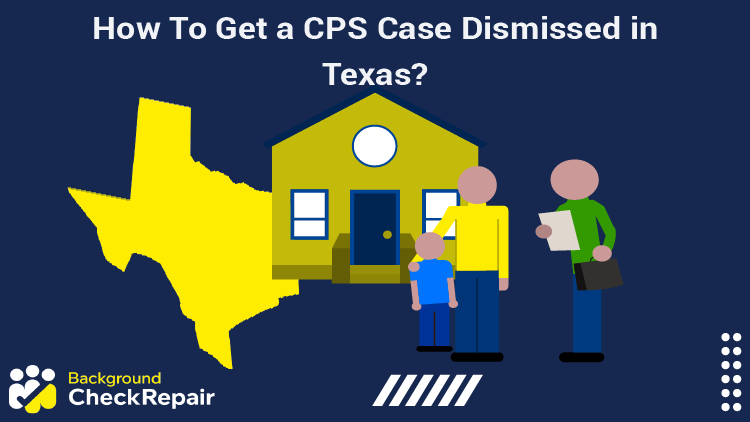
Table of Contents
Anyone facing an investigation from Child Protective Services often want to know how to get a CPS case dismissed in Texas.
Since every state has it’s own legal requirements and processes concerning CPS investigations, understanding and having the laws explained (step by step) is essential to increasing parents’ chances of winning the case and having the investigation dropped.
The reality is that CPS cases can be difficult to win, especially for individuals who are not aware of the powers of CPS and the way the process works.
The first thing to know about how to get a CPS case dismissed in Texas involves understand what this massive government agency can, and can not do.
This guide explains everything about Texas CPS law.
When it comes to how to get a CPS case dismissed in Texas, the exact steps to get a CPS case dismissed will depend on the unique circumstances of the investigation.
Every investigation is different and there are several different ways to get the case dropped.
However, there are some things that parents should do immediately.
Obtaining an expert legal representative is the best way to ensure that parental rights are not ignored, and that a rouge CPS agent doesn’t go beyond the law.
Since CPS can take a child without the parents consent (not from the home without a warrant), it’s crucial to document all interactions with CPS agents, offices, and contacts.
Write down the name of the person, the time, the date, and the issues discussed.
Since CPS conducts investigations, it’s crucial to have character witnesses to the family life.
Although it is possible to go through the more traditional method of getting a case dropped, which generally involves filing for a dismissal of the case in court with the help of an attorney, this should be seen as a last resort.
Ideally, individuals will want to get the case dropped long before the courts get involved.
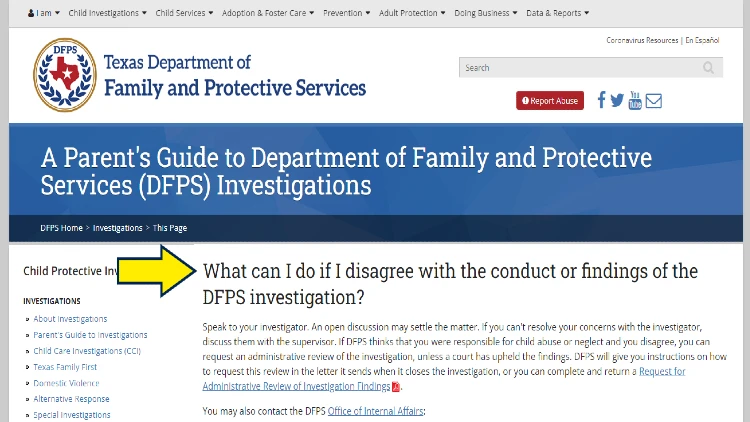
The Texas Department of Family and Protective Services conducts investigations, and parents do have a process for filing complaints about the investigator and request administrative reviews.
In order to figure out the best approach to get the case dismissed, individuals need to understand a few relevant Texas state laws as well as a general understanding of the way a Child Protective Service case works, what can happen, and what can’t happen.1,2
CPS or Child protective services is a state agency that is usually a division of the state’s Division of Child and Family Services.
Although there are federal laws that must be obeyed by these agencies, they must also abide by state laws regarding their practices.
CPS is mainly in charge of ensuring that children are safe and having their basic needs met, and can make recommendations to the court if they believe a child is a victim of abuse or neglect at the hands of their parents or guardians. It’s important to know that CPS is more of a social services agency than a law enforcement agency.
If a situation could become dangerous, CPS will elicit the help of local law enforcement, usually the county sheriffs.
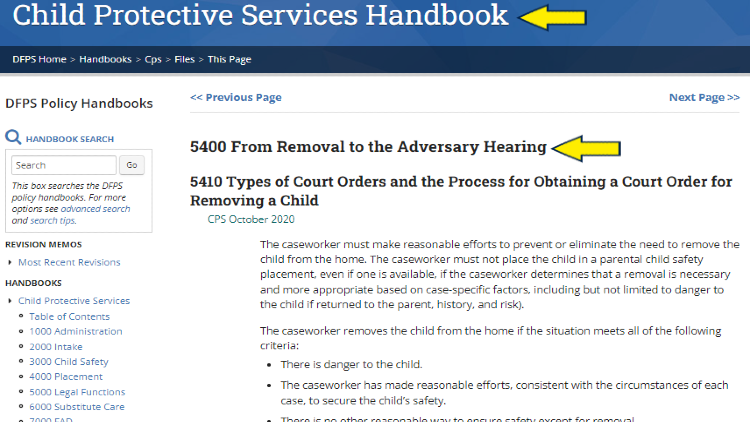
The state government provides information about the various court orders that can be issued from CPS investigations.
One of the common misconceptions about CPS cases is the specifics of how they work. Many people will see the word ‘case’ and assume that a formal case has been opened in court, which may include criminal charges or something similar.
However, this is generally not how it works.
Much of this confusion is caused by the term ‘CPS case’, which can more accurately be described as a CPS investigation.
A CPS case is opened when CPS has reason to suspect that abuse or neglect is occurring at a certain household.3 In most cases, this will be the result of someone making a report to CPS after seeing signs of abuse or neglect.4
Although in many cases this will be a parent that does not have primary custody reporting this information, in most cases, it will be a report made by a mandatory reporter that will trigger the case being opened.
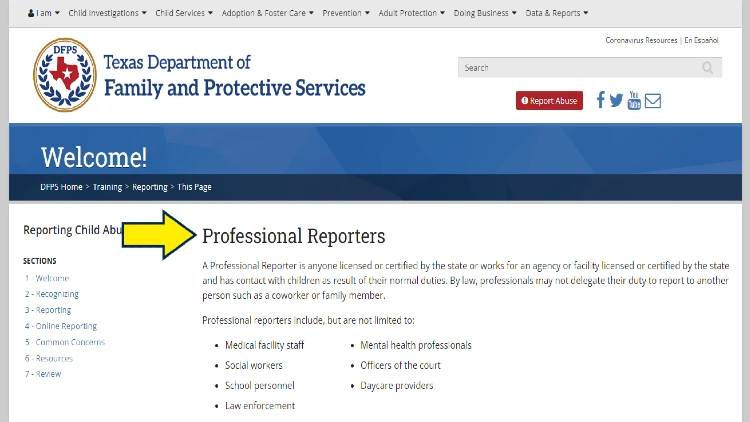
Reports given by professionals, such as medical staff, school and daycare providers are immediately investigated.
Mandatory reporters are individuals who are required by state law to report any suspected neglect or abuse to CPS,5 the most notable example of this would be teachers, but doctors and mental health professionals are also required to make these reports.
If the report is deemed even remotely credible, a case will be opened and CPS will begin investigating if abuse or neglect has occurred.
When it comes to how to get a CPS case dismissed, it is possible to get the case dismissed at any point in the process. However, similar to getting a criminal case dismissed, the earlier the case is dropped the better.
The case usually begins with a visit from a CPS caseworker who will likely want to talk to the parent and anyone living in the household as well as the child that is the subject of the case.
Investigations take many different forms, so the exact steps will vary widely. However, as soon as individuals become aware that they are under investigation by CPS, they should contact an attorney as soon as possible.
Family lawyers will be able to guide individuals through the process, explain possible outcomes, help get the case dismissed, and help the individual keep custody of their children. Although many people’s first instinct with CPS might be to cooperate or do the complete opposite, a lawyer can give advice on when to accept or deny requests made by CPS, as this is a situation in which anything the individual says can be used against them.
Many CPS cases are made simply to harass another individual. CPS has lots of experience dealing with these kinds of cases and as a result, many CPS cases are closed fairly quickly.
CPS is simply looking for evidence of abuse or neglect when they begin their investigations. If it becomes clear early on that there is no abuse or neglect of any kind, they will likely close the case fairly quickly which is generally the best-case scenario.
If there is some evidence of abuse or neglect, the investigation will likely continue and will probably increase in intensity. When this happens it is highly likely that the child will be removed from the home for the remainder of the investigation.
In situations where two individuals have dual custody of the child, the child’s custody will be temporarily transferred to the other individual. This other individual who is not under investigation is known as the non-offending parent.
Despite not being involved, the non-offending parent in CPS case can play a major impact by providing evidence and testimony at future hearings, should there be enough evidence for CPS to involve the courts.
If CPS believes there is abuse or neglect occurring, they will likely get the courts involved and the parent will need to appear before a judge for an adversary hearing to explain the situation.6
During this time, the CPS caseworker might give the parent-specific instructions to improve the situation for the child. This is more common in situations involving neglect rather than abuse.7 It is important to follow these steps as this can be another simple way to get the case dropped, even after it has reached the courts.
If CPS believes abuse or neglect is not occurring, they can drop the case at any time.
Besides simply following CPS instructions, the judge in the case can also have the case dismissed. This is where a lawyer can be invaluable.
There are two main reasons that a judge will choose to drop a CPS case that is still in progress: Procedural issues and Lack of evidence.
When it comes to procedural issues, this will generally refer to the case being thrown out because the investigator is clearly harassing the individual or possibly doing something illegal during the course of their investigation. Like criminal cases being dropped due to illegal police searches, CPS cases can be thrown out for similar reasons.
Knowing Texas laws and having a lawyer to advise you will be the best way to get a case dismissed for procedural issues.
However, the more common reason for a judge to dismiss a CPS case is due to a lack of evidence. Once again a lawyer can help their client make the case that the investigation has continued despite CPS not being able to produce any evidence.
A lawyer will likely advise an individual to file for dismissal if CPS does not have enough evidence to justify an investigation.
Those wondering how to get a CPS case closed should know that the sooner you get the case closed the easier it will be. Should the case make it to court, this is usually an indication that there is significant evidence of abuse or neglect, and getting the case dismissed at this stage is far more difficult.
Individuals who want to know how to get a CPS case dismissed fast, should contact a lawyer who can assess the situation and give advice on the best plan of action. In many cases, this will be to simply cooperate with CPS so they will close the case within a few days on their own.
When it comes to how to beat CPS in Texas specifically, individuals will want to know the Texas laws that CPS will be citing, so that they can be directly disputed.
Most notably, individuals should be familiar with the Texas state definition of abuse and neglect, as well as what constitutes things like domestic violence, emotional abuse, and abandonment.8, 9, 10, 11
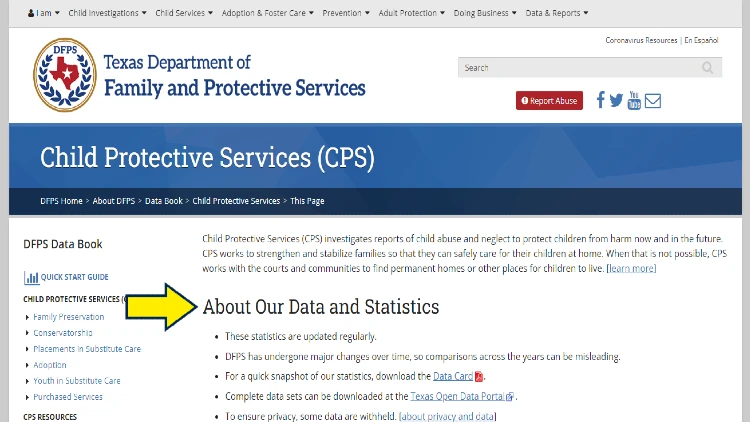
The Texas Department of Family and Protective Services also provides statistics and data about their activities in the state.
Although most people will fear the worst upon learning they are being investigated by CPS, CPS case statistics show that over half of CPS cases are simply dropped after finding no evidence of abuse or neglect.12
Many people may have the impression that when it comes to potential child abuse, CPS is allowed to be above the law but this is not true. These misconceptions cause many people to question, whether can a judge dismiss a CPS case, and the answer is yes.
A judge will be able to dismiss a CPS case if there is no evidence of abuse or neglect, especially if the subject of the investigation is being negatively impacted by the case.
After a CPS case has been closed, most individuals will be worried about how the case will affect them in the future. Some of these fears are triggered by terms like CPS background check, which can cause individuals to believe they are in some kind of database.
A CPS background check is also referred to as a child care background check, a foster parent background check, and a child abuse background checks.
All of these checks are the same and refer to the federally required child care background check,13 which must be performed on individuals who work with children like the background check for daycares, teaching positions, and those who take in foster children.
When it comes to, how long a CPS case stays on your record, most CPS cases will not be on your record at all.
Unless the case involves criminal charges there will be no information relating to the case that could show up on a pre-employment background check. However, should the case involve abuse or neglect then there the individual will be put into a child abuse database which is checked for certain jobs that involve children.
Those who are still unsure should learn how to obtain a criminal background check just in case. This can be done using the search bar at the top of this page.
It’s extremely important to know what CPS can and cannot do in Texas. Knowing what is allowed and what isn’t can make a huge difference when it comes to how to get a CPS case dismissed in Texas.
Luckily, the list of what they can and can’t do is fairly straightforward.
Here is the list of what CPS can do in Texas.
CPS investigators do not need to make appointments before showing up at someone’s house and asking if they can look around. Should this permission be granted they will also want to talk to people that live in the house as well as the child that the report was made about.
CPS is also able to talk to the children without the parent’s knowledge or permission. This is done so that parents do not have an opportunity to coach their children and tell them what to say.
Although they can not make this decision on a whim, CPS is able to get court orders that allow them to forcibly remove children from a home if abuse or neglect is taking place.
Should there be significant evidence of abuse CPS can also request a judge to take away parental rights so that the abuser will not have unsupervised access to the parent.
Here are two of the things that CPS cannot do in Texas.
CPS must be invited into a home for their investigation. Even if CPS shows up unannounced, individuals are not required to allow them to enter the home. However, CPS will eventually get a court order to enter the home if they believe abuse is taking place.
Substance abuse constitutes neglect in Texas, however, CPS can not force someone to take a drug test without a court order.
When it comes to how to fight CPS and win in Texas, getting a lawyer will give individuals by far their best chance. Although the idea of diving into Texas state law might seem intimidating, familiarizing yourself with the CPS laws and procedures can make the difference between your child staying with you or being taken away.
When working to get a CPS case dismissed in Texas is concerned, individuals will have a ton of different avenues to explore. The most important thing to remember is that the sooner the case is dismissed the better, so dragging out the case is rarely a good idea.
Facing a CPS investigation alone can be scary and is seriously ill-advised. Individuals should learn their local state laws and contact a family lawyer to better understand how to get a CPS case dismissed in Texas.
CPS background checks will go back forever and uncover an individual’s entire criminal history.
Getting a CPS case dismissed in California will usually involve proving there is no evidence of abuse or neglect to a judge.
Getting a CPS case dismissed in Pennsylvania will involve filing for a dismissal with the judge on the case, usually on the ground of procedural issues or lack of evidence.
The most notable power of CPS in Michigan is their ability to remove children from the home with a court order. However, CPS is not able to enter a person’s home in the state without their consent.
In New York, CPS is able to talk to children without the parents’ permission to ask about possible abuse and neglect. A power CPS does not have in the state is to force someone to take a drug test without a court order.
The steps on how to locate where someone works for garnishment usually involve a social media background check or similar types of searches.
The IRS and SSA are government agencies that can help individuals how to locate where someone works for child support. Note that the databases of these two agencies are not available to the public.
1U.S. Department of Health and Human Services. (2023). State Statutes Search. Child Welfare Information Gateway. Retrieved January 04, 2023, from <https://www.childwelfare.gov/topics/systemwide/laws-policies/state/?CWIGFunctionsaction=statestatutes:main.getResults>
2ChildCare.gov. (2023). Child Protective Services. Childcare.gov. Retrieved January 04, 2023, from <https://childcare.gov/consumer-education/child-protective-services>
3U.S. Department of Health and Human Services. (2023). How to Report Child Abuse and Neglect. Child Welfare Information Gateway. Retrieved January 04, 2023, from <https://www.childwelfare.gov/topics/responding/reporting/how/>
4U.S. Department of Health and Human Services. (2023). Identification of Child Abuse & Neglect. Child Welfare Information Gateway. Retrieved January 04, 2023, from <https://www.childwelfare.gov/topics/can/identifying/>
5U.S. Department of Health and Human Services. (2019, July 16). Mandatory Reporters of Child Abuse and Neglect. Child Welfare Information Gateway. Retrieved January 04, 2023, from <https://www.childwelfare.gov/pubPDFs/manda.pdf>
6Texas Department of Family and Protective Services. (2023). Child Protective Services Handbook. Texas Department of Family and Protective Services. Retrieved January 04, 2023, from <https://www.dfps.state.tx.us/handbooks/cps/files/CPS_pg_5400.asp>
7U.S. Department of Health and Human Services. (2023). Definitions of Child Abuse & Neglect. Child Welfare Information Gateway. Retrieved January 04, 2023, from <https://www.childwelfare.gov/topics/can/defining/>
8U.S. Department of Health and Human Services. (2022, September 23). Definitions of Child Abuse and Neglect. Child Welfare Information Gateway. Retrieved January 04, 2023, from <https://www.childwelfare.gov/pubpdfs/define.pdf>
9Texas Department of Public Safety. (2010, October 13). Chapter 5 Family Violence. Texas Department of Public Safety. Retrieved January 04, 2023, from <https://www.dps.texas.gov/crimereports/08/citCh5.pdf>
10Office of the Texas Governor. (2023). Safety and Protection. Office of the Texas Governor. Retrieved January 04, 2023, from <https://gov.texas.gov/organization/disabilities/safety_and_protection>
11Texas State Law Library. (2023, January 04). Child Custody and Support. Texas State Law Library. Retrieved January 04, 2023, from <https://guides.sll.texas.gov/child-custody-and-support>
12U.S. Department of Health and Human Services. (2021, June 11). Child Maltreatment 2019: Summary of Key Findings. Child Welfare Information Gateway. Retrieved January 04, 2023, from <https://www.childwelfare.gov/pubpdfs/canstats.pdf>
13ChildCare.gov. (2023). Background Checks: What You Need To Know. Childcare.gov. Retrieved January 04, 2023, from <https://childcare.gov/consumer-education/background-checks-what-you-need-to-know>
We use cookies to ensure that we give you the best experience on our website. If you continue to use this site we will assume that you are happy with it